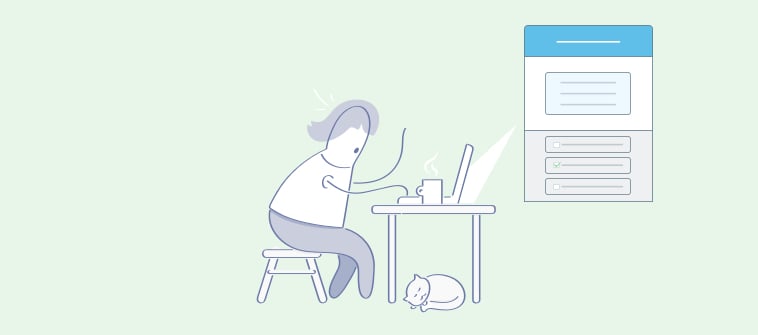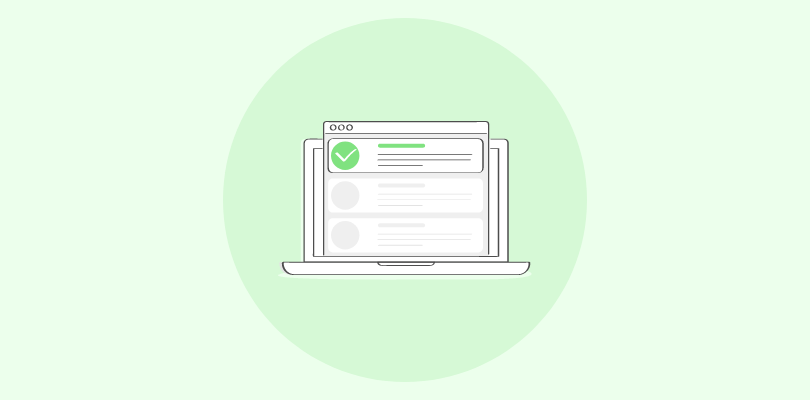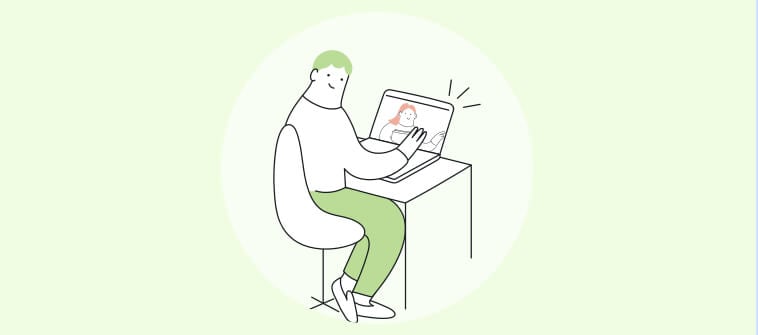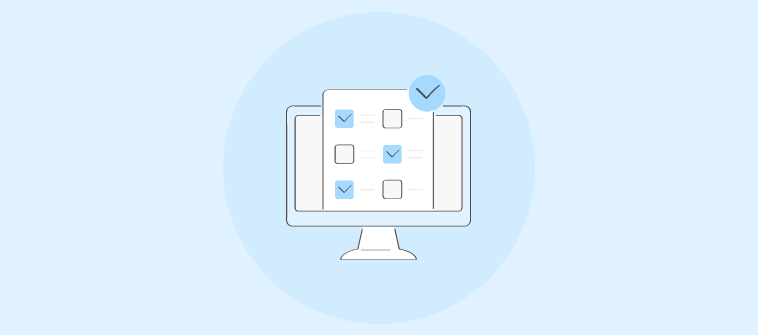Since online shopping and eCommerce have gained prominence, people have gained access to more products than ever at their fingertips.
But what if you’re not sure what to buy?
This phenomenon is quite natural and called ‘Overchoice’ or ‘Choice overload,’ where people find it extremely difficult to decide when they have too many options.
That’s where product recommendation quizzes come in.
As the name suggests, they help consumers make purchase decisions by offering personalized recommendations. These quizzes come in multiple forms, including:
- Product quizzes
- Shoppable quizzes
- Ecommerce quizzes and more.
As many as 63% of customers want recommendations to make a purchase decision. And, around 31% of the eCommerce revenue comes from recommended products alone.
You can leverage this need for personalized recommendations by creating and sharing product recommendation quizzes.
This guide will walk you through all you need to know to create the best product recommendation quizzes for growing your business online.
Let’s dive in.
What Is a Product Recommendation Quiz?
Just as the name suggests, a product recommendation quiz recommends products to quiz takers based on their responses to the questions asked.
Product recommendation quizzes are especially popular on eCommerce websites, where they ask visitors about their preferences or interests and recommend products that closely relate to those characteristics.
The answers to the quiz questions represent different categories, which the quiz maker defines in the building process. The category most frequently chosen by the quiz-taker becomes the recommended product.

There’s something quite similar to eCommerce product recommendation quizzes – the recommendation engine. But, product recommendation engines can cost you thousands of dollars to implement. In contrast, recommendation quizzes provide a whole lot of data at a much lower cost and sometimes even free, depending on the tool you use to create them.
At this point, you surely have a pretty good idea as to what product recommendation quizzes are. So, let’s discover how these quizzes can benefit your business.
Reasons to Use a Product Quiz
As discussed above, over 60% of customers demand product recommendations to make purchase decisions, and product quizzes are the most effective way to deliver that. But that’s just the tip of the iceberg, as there are multiple other ways a product quiz can benefit your business.
Let’s look at some of the key reasons why your business needs a product quiz:
1. Personalize Shopper Experience
The demand for product recommendations and personalized experiences has been increasing every year, and it’s up to business owners to take up that responsibility and deliver that personalization.
Fortunately, many shoppers are willing to share their data for an even more personalized experience.
This is beneficial for the business owners as they get a much better overview of their audience. They can use that data to personalize the experience even more for the shoppers.
Also, it isn’t necessary to have huge resources to offer something as simple as a customized experience.
All you need is a tool you can create a quiz with.
For example, ProProfs Quiz Maker lets you create quizzes for your website in minutes using readymade, customizable personality quiz templates and an intuitive quiz editor.
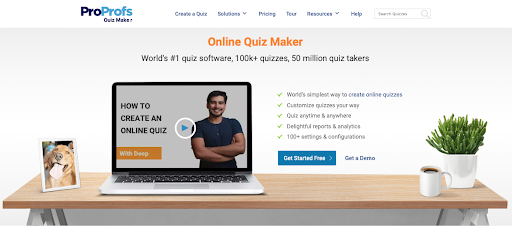
Looking for a free online quiz maker? Get started here
2. Grow Email and SMS List
Getting a visitor’s email or phone number suggests that you have established a direct line of communication with them. This is extremely beneficial for business owners to accurately identify their audience and market to them accordingly and for an indefinite period.
But email lists don’t just grow automatically.
As a business owner, you have to put in a lot of effort initially to make your visitors feel that their presence is appreciated and that they’ll also gain something by sharing their information.
This is where you can use product recommendation quizzes.
These quizzes let customers know they will receive valuable product recommendations specific to their needs if they share their contact information with the business.
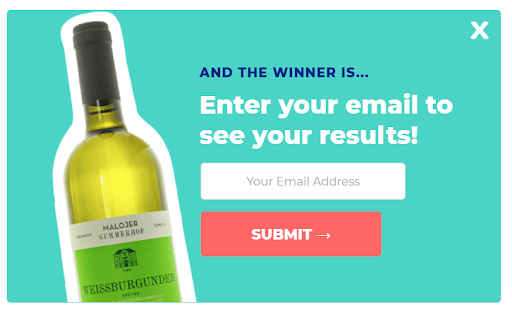

Even the metrics say that interactive and dynamic content, specific to each customer, has almost 2 times higher conversion rate than the static content.
There are multiple ways to collect information using quizzes:
- Providing an option to send the quiz takers’ results to their email.
- Mandating users to enter an email address to see their quiz results.
- Offering discounts and coupons for signing up for the newsletter.
- Asking users to sign up for back-in-stock email notifications.
Pro Tip: You can automatically add the new leads you acquire with your product recommendation quizzes to your email lists by integrating your quizzes with your favorite email marketing tool. Doing so also lets you automate lead segmentation and nurturing.
Watch: How to Integrate Mailchimp With Quiz Maker
Related Read: Want a more detailed view of growing your email list through quizzes? Have a look at How to Grow Your Email List With Quizzes
3. Collect Important Customer Data
Businesses can’t just rely on third-party data for their marketing efforts. They need first-hand data to guide their marketing efforts and be impactful with them.
This is where e-commerce quizzes take things further.
Such quizzes let your business collect data directly from prospects and customers since they share it proactively without hesitation.
Once users take the quiz, they get a product recommendation along with a tailored message that influences them to share their contact information for a more personalized experience.
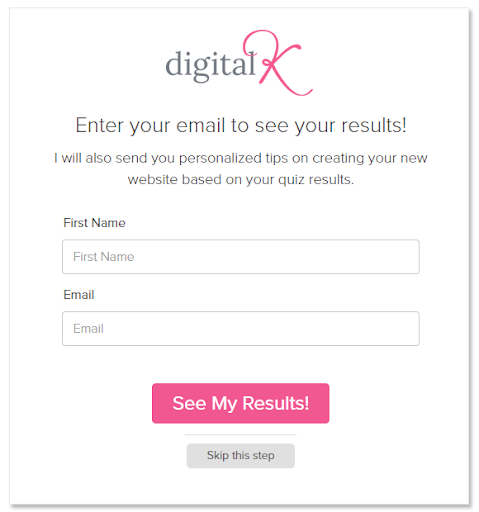
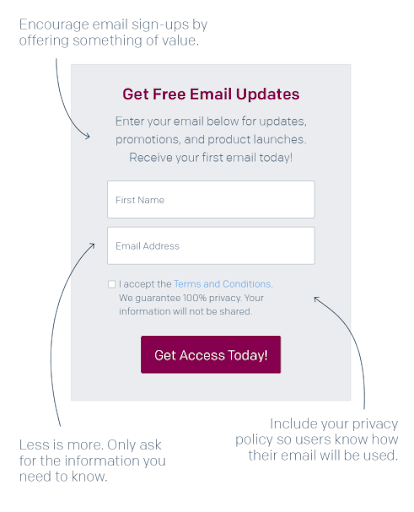
It can be quite challenging for marketers to collect sufficient data relevant to their marketing efforts.
But when customers are more than willing to share their information in exchange for enhanced experiences and discounts, you couldn’t ask for a better start.
Watch: How to Create Customer Acquisition Quizzes
4. Prevent Cart Abandonment
The data you get from offering personalized experiences also helps you build better and more effective cart abandonment campaigns.
For example, suppose a shopper adds products to the cart but doesn’t buy them. In that case, you can use the eCommerce product recommendation quiz to gather their email addresses and send relevant cart abandonment campaigns and discounts to bring them back and convert them.
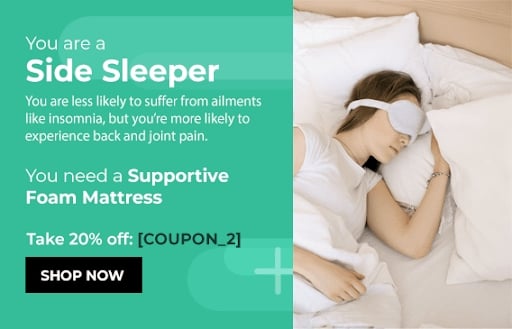
Your quizzes can all be tied to a coupon code, and you can also pass this code to your email service provider to include it in your cart abandonment messages to increase conversions.
You can even invite visitors back to browse the items recommended by your quiz by triggering browse abandonment emails.
The key here is to make visitors spend more time on your platform for increased chances of getting conversions.
Pro Tip: You can also reduce cart abandonment by implementing exit intent popups using a popup tool, such as Picreel or by adding live chat functionality to your website to re-engage visitors.
Watch: What Is Exit Popup Software & How It Increases Conversion
5. Improve Return on Ad Investment
Paid acquisition pays off substantially when done right.
But you need to make sure you’re directing your audience to the pages that’ll convert them.
Promoting your product recommendation quizzes is the best way to go about it since you’re increasing your chances of conversions from personalization and getting a return on your quiz investment (if any).
When engagement quizzes are promoted specifically, the engagement rate is much higher than organic ones. So, the odds of clicks leading to conversions also jump quite high.
Even if shoppers don’t convert right away, you can treat them like a lead and use your marketing efforts to capture them later.
6. Drive More Sales
More people and better experiences lead to more sales and higher profits. It’s a no-brainer.
But not everyone who lands on your website will purchase from you. In fact, 92% of all shoppers on eCommerce websites are people who don’t make a purchase.
But why do so many of them never convert?
Maybe they couldn’t find the right product.
Maybe there were just too many choices that overwhelmed their decision-making.
Maybe they got distracted or were never convinced enough to make a purchase.
There are plenty of reasons why visitors don’t convert.
Although product recommendation quizzes can’t solve problems like converting people who aren’t interested, they can very well convince those on the brink.
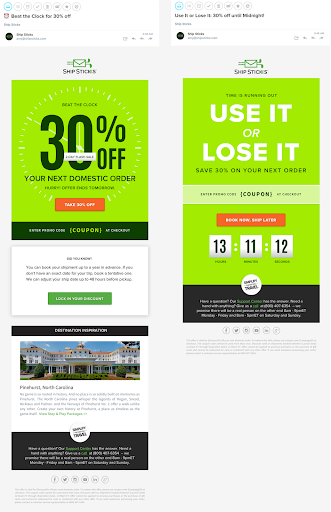
You need to deploy targeted promotions like product recommendation emails, bespoke coupon codes, or on-off offers for such customers on their recommended products.
Plus, if you use a product recommendation quiz maker, you can give your customers the ability to share their quiz results and recommendations with other people with ease to get their input.
Once the customers feel valued and perceive a great offer in the vicinity, the chances of them taking the buying leap increase significantly.
In the following section, we’ll look at some product recommendation examples that’ll help you understand how companies use product recommendation quizzes and generate results in the real world.
Product Recommendation Quiz Examples
These examples illustrate why product recommendation quizzes are a must for your online marketing strategy.
1. Dollar Shave Club
A popular men’s grooming brand Dollar Shave Club also offers one of the best and most engaging product recommendation quizzes. The quiz only takes a minute to assess your personal characteristics, grooming habits, and hygiene routine.
A recommended products list follows up the assessment along with the total cost.
They even justify every recommendation by linking the products with your grooming habit for a better understanding.
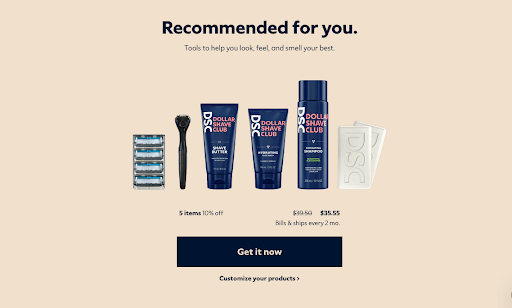
Benefits for the business: The business gets a lot of personal data from users and a higher average order value.
Benefits for the consumers: Free product recommendation without any signup or phone number. It also saves them the effort of browsing the entire product selection.
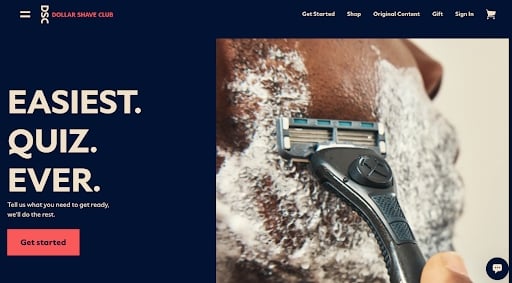
2. Big Hammer Wines
Big Hammer Wines is a popular American winemaker. They offer a quick way of narrowing down options for customers by providing a brief and easy quiz on their website.
The quiz asks for all the details about the customer’s wine preferences to land them on an accurate set of choices.
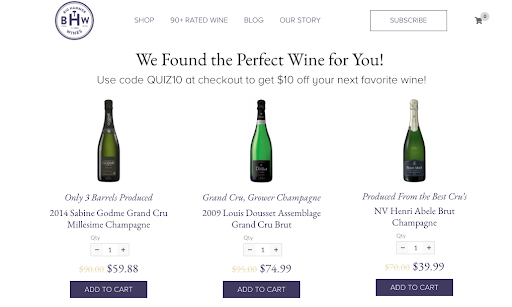
Benefits for the business: The business gets the preferences and habits of their customers along with their emails that they can use for marketing. The quiz even reveals a selection of at least six wines to influence customers into purchasing more.
Benefits for the consumers: The quiz takes less than 30 seconds to complete, and consumers can quickly get their recommended products. The results are also quite reliable as the questions consider all the necessary preferences.

3. Warby Parker
Warby Parker is an online eyewear brand that offers a simple product quiz that users can take and get the eyewear at home to try it for themselves before committing to them. Users can buy their favorite pair right on the spot and pay upfront with a payment plan.
The product page includes all the details, like the images and names of the recommended products, with an option to choose different colors for better customization.
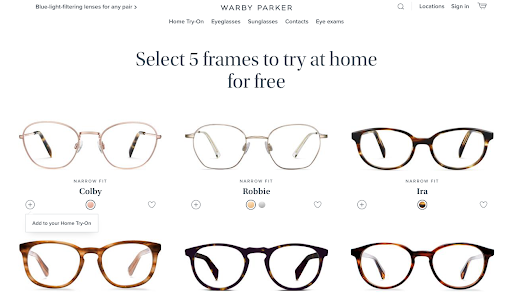
Benefits for the business: The business gets a general sense of their user’s eyeglass and sunglass preferences along with an option for their email address which they can use for marketing efforts. They also let you choose five frames to bring home, increasing the chances of buying multiple frames and increasing sales.
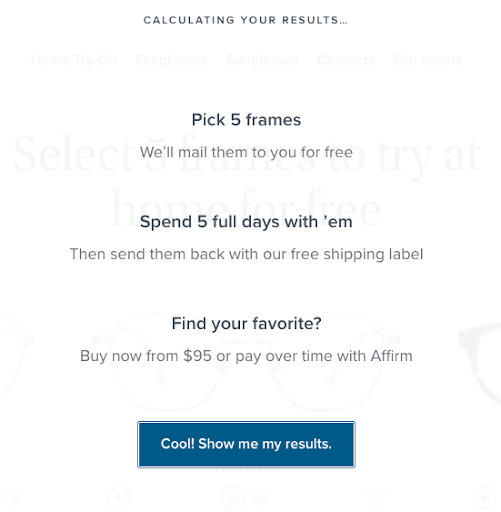
Benefits for the consumers: The quiz only has eight simple questions, and visitors can skip questions if they aren’t sure about their choice. There is no commitment, and you can try the frames before making a purchase. The quiz results are also saved, so you don’t have to take the quiz again.
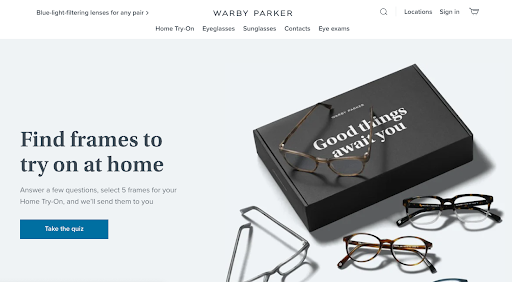
Wrapping up the case studies for product recommendation quizzes, let’s move toward their benefits to give you a better perspective of how to use them.
Benefits of Product Recommendation Quizzes
Product recommendation quizzes and recommendation engines have long been used due to their range of applications and their contribution to an eCommerce business.
Here are some of the benefits offered by product recommendation quizzes:
1. Offer Personalized Experience
A quiz acts like your salesperson when talking about an eCommerce website. Most importantly, your customers will not even consider abandoning because it’s just a fun interactive quiz and not a real salesperson trying to sell them anything.
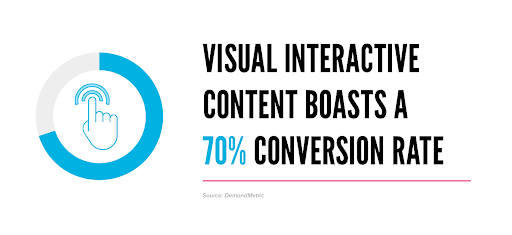
It’s very well known that interactive content can increase conversion rates by as much as 70%, making quizzes one of the go-to marketing methods.
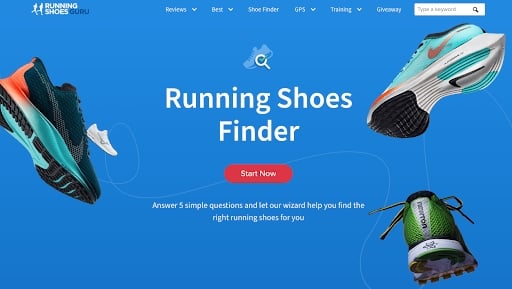
For example, the Running Shoes Finder quiz is one of the great product recommendation examples as it sits on their homepage like a salesperson who is hard to miss at a mall. The quiz asks people five personal questions about the website visitor’s bodies and preferences to make the right choice for them.
Then the recommended products are displayed right away where the best choice is displayed in the center with the second and third best choice on the sides.
It’s hard to resist this type of personalization.
2. Better Social Media Marketing
Statistics say that the average click-through rate on social media is about 2%, and increasing that number can prove to be a little difficult.
This is because social media is supposed to be fun, where people come to relax and have a good time. Here, interactive content can really make an impact when it comes to click-through rate (CTR).
When people scroll social media platforms like Twitter or Facebook, they’d like to watch something fun which also adds value at the same time.
Product recommendation quizzes are exactly that as they single out products that match the quiz taker’s personality and which they should most likely buy.

For example, the BuzzFeed quizzes are some of the most popular on Facebook, and many people engage with them as they try to explore their options and personality at the same time.
With the ability to easily embed these quizzes on social media, this is a great opportunity to increase click-through rate (CTR) and create better social media marketing strategies.
3. Boost Lead Generation
A product recommendation quiz is a customer intelligence tool, and there’s no debating that.
As we discussed earlier, a quiz can also act as a huge data-collecting tool and be deployed as a data-driven sales opportunity. You can easily build a comprehensive email list and nurture those leads based on the data you collect from the quiz.
But how do you ensure visitors provide their information?
The answer is reciprocity.
To access the personalized results and see the recommended products, users must enter their email or phone number. This makes every quiz taker a potential lead for your business.
Watch: How to Easily Generate Leads With Lead Quizzes
Pro Tip: You can give discount coupons to every visitor who fills out a form to make them feel valued and appreciate your marketing efforts.
Pro Tip #2: You can employ a customer relationship management (CRM) tool like Big Contacts along with your product recommendation quiz maker to manage your sales cycle.
4. Better Customer Insights
Collecting insightful user data is a tough nut to crack, but it doesn’t seem to be that hard when interactive shoppable quizzes are used.
A product recommendation quiz tells you a lot about a customer’s intentions, including their budget, requirement, and many other characteristics you can use to help them and your business in a better way.
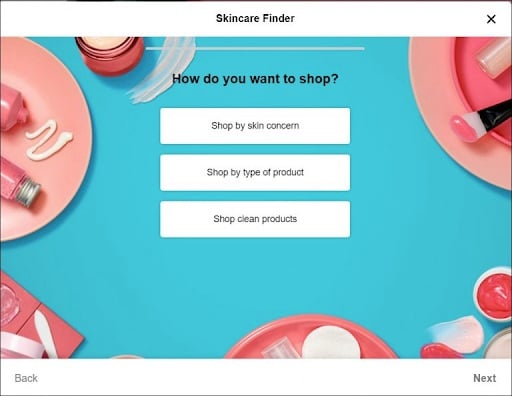
For example, Sephora asks customers about their shopping criteria at the beginning to segment the leads based on their selections and retarget their prospects effectively.
The organization even sets up different campaigns for people who fall in different criteria, targeting every customer with personalized marketing efforts.
So, product recommendation quizzes are probably the best way of gaining valuable insights about your customers in a natural way.
Pro Tip: Besides quizzes, there’s another amazing way to get customer insights from your website – You can implement non-intrusive, contextual popup surveys using a survey tool, such as Qualaroo. Contextual website surveys let you get valuable customer feedback by asking the right questions at the right time.
Watch: How to Create a Popup Survey
5. Increased Traffic
Visually appealing content is more engaging.
For example, what do you think you are more likely to click on?
This?

Or this?
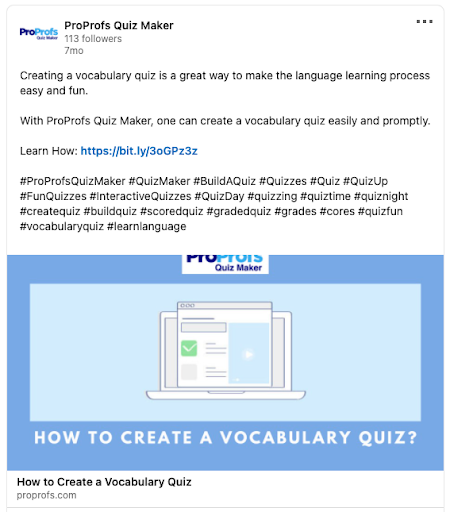
Most likely, the latter.
Engagement quizzes can easily overcome this barrier as they greet the quiz takers with a visually appealing message and make the work minimal for creators.
Ecommerce product recommendations are everything that an engaging ad should be. This is why they’re great for increasing traffic and overall engagement.
Now that you know why you should implement product selection quizzes and how they can benefit you, let’s look at how you can easily create them online.
FREE. All Features. FOREVER!
Try our Forever FREE account with all premium features!
How to Make a Product Recommendation Quiz
Before creating a product recommendation quiz, the first thing to do is have a lineup of products you can recommend to your visitors.
The next thing to do is follow a series of simple steps that are universally applicable to all product selection quizzes, irrespective of the business or product.
Here they are:
Step 1: Planning the Quiz
Planning the quiz includes the most basic function, which is to identify the quiz’s purpose.
The quiz should help people find their dominating personality traits, and the result should be products that represent that personality in the best possible way.
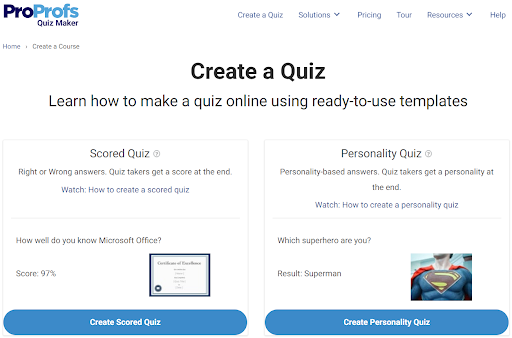
When you’re creating your quiz, there are two ways to go about it:
- You can either make a quiz from scratch
- Or you can choose from one of many product recommendation quiz templates and edit it along the way.
When creating a quiz from scratch, you can select ‘Create a quiz from scratch’ and then add a background, images, logo, and title. Then you need to add questions. If you’re using a quiz maker tool, go for the one that has a question library to import questions from. After this, you can manage settings according to your preferences.
We would recommend choosing a template to jump-start your quiz building. You can choose a product recommendation template, preview it and simply click on the ‘Use this template’ button to get started. You can then add, delete or modify questions from the library.
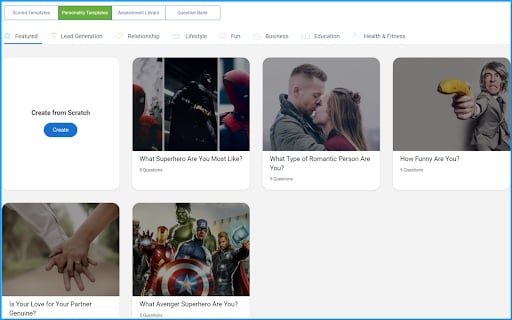
There are tons of different templates to choose from, and one way to narrow down your search is by choosing the most relevant category that fits your product lineup. The important thing to remember is that every template is completely customizable, so you don’t have to worry about being specific or rigid as per the chosen templates.
Some of the possible quiz topics you can choose from the templates are:
- For clothing brands: What clothing style suits me?
- For bookstores: What book genre is right for you?
- For consultation companies: What business should I start?
- For travel agencies: Which country best fits your personality?
- For makeup brands: Which foundation shade am I?
Once you’ve selected the right product recommendation template, you can start creating your quiz.
Also, while creating a quiz, there are several questions you need to ask yourself to stay on top of any shortcomings and prioritize and set objectives for the quiz. These questions are:
- What am I hoping to achieve from this quiz?
- Who am I hosting this quiz for?
- How do I want my quiz-takers to feel?
- How will I assess my product recommendation quiz’s success?
- Are there any limitations to the quiz that my visitors may feel?
Once done with the pointers, you’re set to move on to the next steps.
Watch: How To Create a Quiz Using Question Bank & Templates
Step 2: Plan the Outcome
To ensure you’ve mapped out everything accurately and that your answers will be relevant to the quiz results, you need to plan the outcome before you do anything else.
Planning the outcome not only involves setting up the answers but also deciding how you want your quiz-takers to react when they see the results.

For example, if you’re building a quiz titled ‘What kind of a shopper are you?‘ for your quiz-takers, the personalities you include can be practical, bargain, or impulsive.
There are several ways you can choose to end the quiz, and there can be several outcomes which include:
- Making quiz-takers purchase the recommended products to complete the sales cycle.
- Gathering their emails and phone numbers for marketing.
- Having them sign up for the newsletter.
- Make their shopping experience engaging and fruitful with shoppable videos.
You need to add products for the different personalities for your product recommendation quiz that’ll act as a climax for your quiz right at the end.
You can make a big difference and leverage your quiz to increase conversions by providing recommendations at the end.
You can also add the CTA and sharing options at the end of the quiz so your customers can further engage with the quiz and easily buy the product at the end for a seamless buying experience.
Step 3: Establish Different Personalities
Remember the phrase “Start with the end in mind”? Product recommendation quizzes work exactly this way.
You can’t add questions to your quiz until you’ve decided what personalities/outcomes those questions will lead to.
For example, if you’re creating a product recommendation quiz titled “What is Your Clothing Personality”, your choice of personalities can be classic, trendy, dramatic, sporty, romantic, etc.
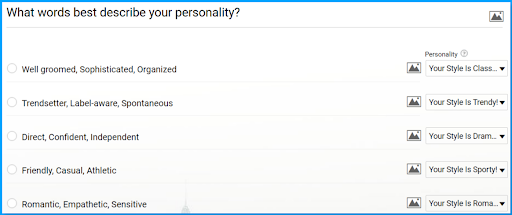
Make sure each possible outcome is mapped to an answer option. For example, let’s say you want to have five different personalities at the end of your quiz. Then, you need to have questions with at least five different options that can be mapped toward each personality to give an accurate result.
Also, when you’re creating personality quizzes, ensure that your list of possible outcomes covers every important personality trait related to your quiz topic.
Personality quizzes are fueled by the human tendency to know more about themselves; defining an ample number of personality traits with accuracy and description is the most important step in these shoppable quizzes.
Step 4: Create Questions
Once you’ve defined the outcome of your product selection quiz and the personalities that you’d like to have, you can add the questions.
It’s always recommended to have questions that are simple and easy to understand.
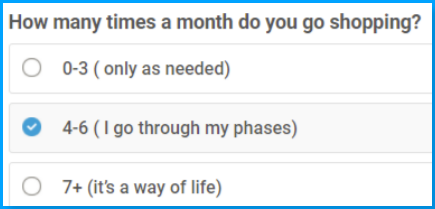
It’s also best to keep the number of questions between 7 and 10.
This way, you won’t take too much of your visitors’ time and can gather significant data to map their personalities. But make sure your choices reflect the personalities they represent.
Pro Tip: Have a blend of personality, interest, and routine questions to break the monotony and also keep quiz takers interested.
Take the same example as the last step. If you’re looking to tell the quiz-takers what dressing style suits them best, your set of possible questions can include:
- Choose the image that best represents your personality.
- What clothing gift would you like the most?
- How would your friends describe you?
- What accessories do you usually wear?
- What type of shoes do you like to wear?
- What are your top 3 favorite clothing stores?
- What type of perfume do you wear?
Always try to create a mix of question types and add images & videos to give your shoppable quizzes a more pronounced and vibrant look. Text-only questions tend to get boring.
Once you’ve added all the questions and mapped your personalities to each option, you can now make your quiz look exactly as you want by customizing it.
Related Read: Looking for the best personality quiz questions? Check out 25 Best Personality Quiz Questions to Know Anyone Better
Step 5: Customize Your Quiz
Once you’ve got all the questions and personalities in place, you can add themes to complement the content of your quiz.
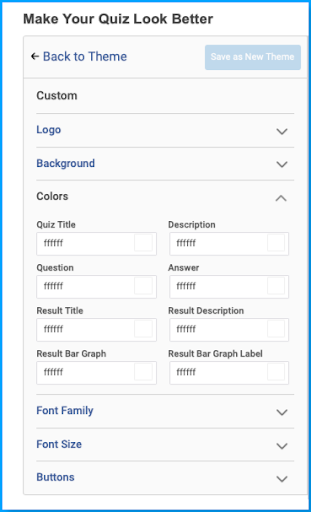
Your quiz should fit perfectly with your brand, which is why using fonts and colors that represent your brand is the best way to go about it.
Watch: How to Design Beautiful Quizzes
You can even add your brand logo so that whenever people share your quiz, everyone sees where it’s coming from.
The creation part of your quiz comes to an end at this point; the follow-up steps would be:
- To integrate your quiz with an email marketing platform
- Embedding it on your website
- Collecting and analyzing results
Watch: How to Create a Personality Quiz
Want to learn more about making quizzes online? Check out our ultimate quiz-making guide.
Boost Sales Easily With Product Recommendation Quizzes
Product recommendation quizzes are arguably the most intuitive and engaging way of sending recommendations to make purchase decisions.
Now that you know how recommending products to your potential buyers can simplify their buying experience and boost sales, there’s no apparent reason to wait anymore to implement them.
All you need to do is choose a top-notch quiz maker tool that’ll let you easily and quickly create high-converting quizzes.
ProProfs Quiz Maker lets you do this and more. It offers an intuitive quiz editor along with an amazing quiz resources library that makes quiz creation a breeze. ProProfs’ library contains thousands of quiz templates you can quickly edit to create product recommendation quizzes for WordPress, Shopify, WooCommerce, and more.

 We'd love your feedback!
We'd love your feedback! Thanks for your feedback!
Thanks for your feedback!


